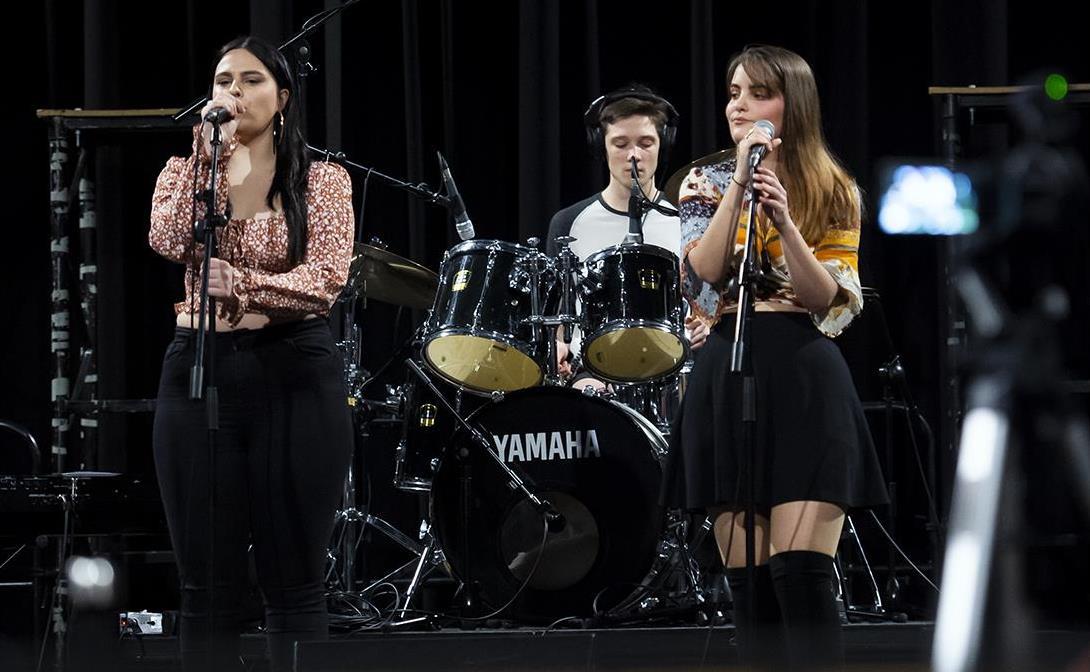Whether your passion is singing and live performance, sound engineering and production, or event management and the business side of the entertainment industry, gaining formal qualifications in your chosen field can help you accelerate your career.
At Adelaide College of the Arts (AC Arts) experienced industry professionals and access to state-of-the-art equipment and facilities can help you pursue your passion and build on your existing skills.
AC Arts offers a range of courses and study options in sound and music including short courses, Certificate 3 and 4 qualifications, and the Diploma of Music Industry.
‘We offer courses in music performance, sound production, and electronic music production all delivered in the Adelaide College of the Arts. Our students have access to world-class theatres, sound recording studios, and equipment,’ said lecturer and course co-ordinator Paul White.
The leader in music and sound production education in Adelaide, AC Arts is centrally located in the heart of the Adelaide CBD.
‘The professional studios and rehearsal spaces replicate what’s out there in the real world,’ White said.
Students learn about current industry trends and practices in the key areas of studio recording, electronic music, live sound and performance, music production, and music technology. Developing this realistic understanding of music industry practices and expectations is an essential asset in such a competitive and fast-moving field.
‘All the lecturers in our courses are professionals currently working in the music industry. The range of their experience and expertise is vast,’ White explained.
‘We have lecturers that have toured extensively around the world; won recording Grammy awards; been front-of-house engineers for major festivals like Womadelaide; composed music for film and television; and some who are world-renowned electronic music producers.’
.jpg)
Photo credit: Juan Photography.
The opportunity to learn from professionals with current ‘real-world’ experience is one of the great attractions of studying at AC Arts. These relationships can also lead to important networking opportunities that can increase your chances of finding employment during or after study, while the focus on industry relevancy means much of the course content is practical, so that students are career-ready when they graduate.
From the very beginning, students are working in actual studios, recording with industry-standard equipment, and learning in hands-on environments that combine theory with practical skills.
They can also study music business and management courses in order to help maintain a career off-stage.
‘The best thing about my course has been the opportunity to push myself out of my comfort zone – it’s just opened up so many new avenues,’ said AC Arts music student Olivia Rec-Chipita.
AC Arts incorporates a variety of teaching and learning styles to ensure students get the best outcomes. This can include face-to-face learning in the classroom, workshop, rehearsal spaces and studio; online learning; individual projects and research; and industry tours and partnerships with organisations such as the South Australian Film Corporation and Adelaide Festival Centre.
The music courses cover the theory and practice of producing and performing commercial music, including arranging, composition and music business principles. Music students can put their classroom learnings into practice with opportunities to work at major festivals and events.
Sound production students learn how to use an array of audio production equipment to capture, edit, record, mix, modify, synchronise and broadcast sound for different types of performance.
.jpg)
Photo: Juan Photography.
AC Arts is also the only accredited provider in SA for the internationally recognised AVID Pro Tools Certified Training Program. This enables students to become proficient in the use of ProTools software and hardware for digital audio production.
‘Our sound production program also has valuable training partner relationships with internationally renowned audio software manufacturers McDSP & Sonnox (Sony Oxford),’ said White.
Collaboration with other students is an important part of the learning journey for students at AC Arts.
‘The most exciting thing about the courses is the collaboration between all the creative industry faculties,’ said White.
The music and sound courses at AC Arts are open to all students whether they are school-leavers just starting out in their career, or experienced industry practitioners wanting to upgrade their skills and knowledge base.
If you’re dreaming of a music career, you can apply now for study in 2021. Admission is not based on your ATAR and there are no individual subject or score requirements, meaning anyone with the passion and ambition can apply now through SATAC.
Visit TAFE SA for details about the information session and the Music and Sound Production course.





